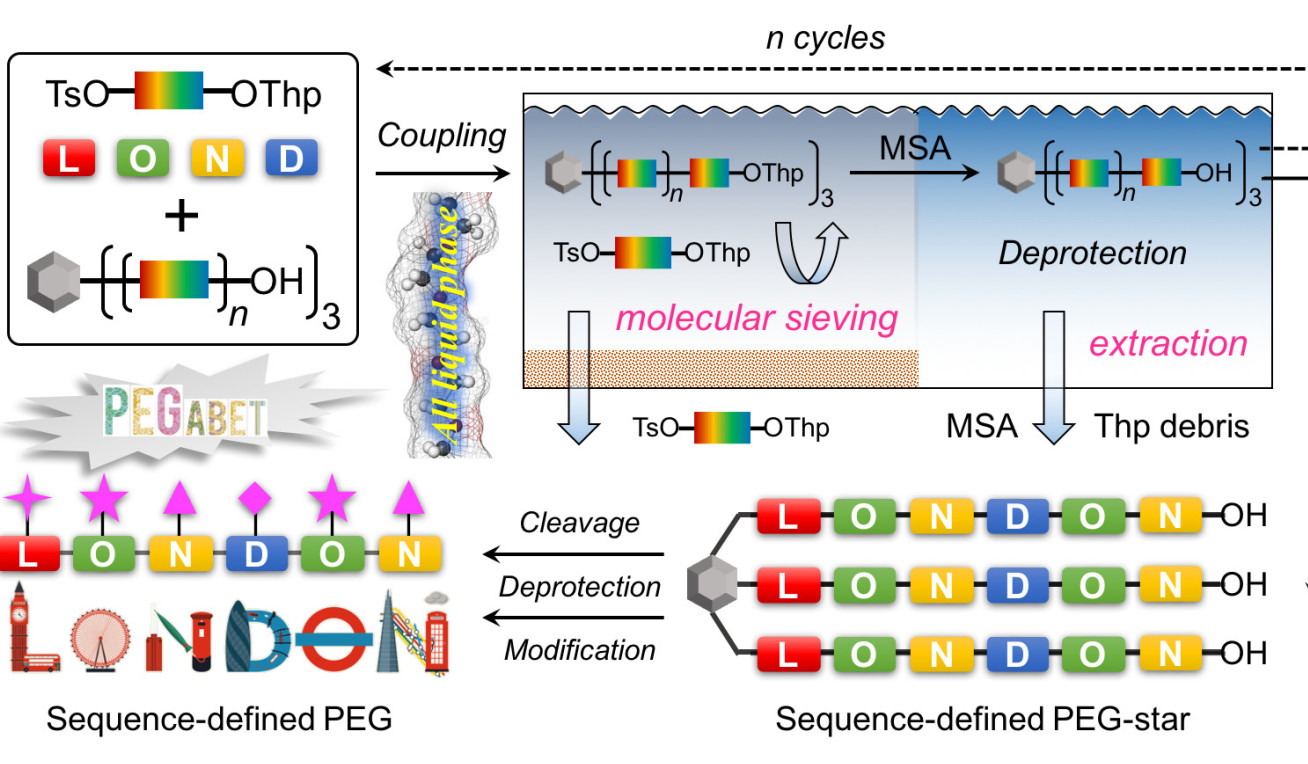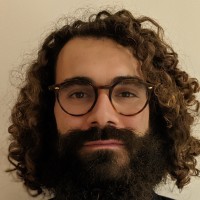EXACTYMER - synthetic polymers with precise monomer sequences
 Professor Andrew Livingston's European Research Council Advanced Research Grant (2018- 2023) EXACTYMER seeks to develop synthetic polymers with precisely defined monomer sequences – exact polymers. This is an exciting and highly challenging project which involves iterative synthesis, in which specific monomers are added one-at-a-time to the end of a growing polymer chain, affords exquisite control over the final sequence, but requires accurate purification of the growing polymer with each and every cycle.
Professor Andrew Livingston's European Research Council Advanced Research Grant (2018- 2023) EXACTYMER seeks to develop synthetic polymers with precisely defined monomer sequences – exact polymers. This is an exciting and highly challenging project which involves iterative synthesis, in which specific monomers are added one-at-a-time to the end of a growing polymer chain, affords exquisite control over the final sequence, but requires accurate purification of the growing polymer with each and every cycle.
EXACTYMER will create new super-stable, ultra-selective nanomembranes, with high permeances, enabling rapid, repeated purifications, which will transform exactymer fabrication. Multiple growing polymer chains will be attached to a central hub molecule to create a macromolecular homostar with enhanced molecular size, promoting accurate separation of the growing exactymer from reaction debris via nanomembrane processing. Automation and engineering will enable rapid, accurate and precise cycles of exactymer chain growth.

EXACTYMER’s objectives will be achieved through curiosity-driven research into (1) the creation of nanomembranes with exquisite molecular selectivity between growing homostars and monomer plus reaction debris; (2) advancing the chemistry of iterative synthesis by creating strategies for step-wise growth of polyethers, polysiloxanes, and polyesters, and side chain functionalised monomers of these species; (3) combining iterative chemistry and nanomembranes together in an automated homostar nanofiltration platform, and; (4) exploring the use of exactymers in healthcare, nanotechnology and information storage.
The most profound anticipated outcome of the project is a new capability to produce synthetic polymers, over 20 monomers in length, with exactly defined monomer sequences to an unprecedented accuracy, at multi-gram scale. New scientific insights will derive from the properties and performances of these newly accessible molecules.
| Researcher | Brief biography |
|---|---|
 |
Dr MARCUS COOK, POST DOCTORAL RESEARCH ASSOCIATEMarcus holds a PhD in Chemical Engineering obtained under the supervision of Professor A. Livingston at Imperial College London. He held positions as Research Engineer and Development Chemist within industry before returning to the Livingston research group in the summer of 2020. |
 |
Dr ANGELO MONTEIRO, POST DOCTORAL RESEARCH ASSOCIATEÂngelo, who completed his PhD in March 2020 at Queen Mary Uiversity of London, joined the Livingston Group in July 2020. He is now currently working on iterative synthesis of polymers. |
 |
Dr JIHOON KIM, POST DOCTORAL RESEARCH ASSOCIATEJihoon received his BEng in the Department of Chemical Engineering (2012) and MS-PhD in the Department of Energy Engineering (2017) from Hanyang University in South Korea. Before joining the Livingston group in 2018, Jihoon developed various membrane technologies in terms of materials, fabrication methods, and systems for energy-efficient separation and energy generation. |
 |
Dr PIERS GAFFNEY, POST DOCTORAL RESEARCH ASSOCIATEPiers studied the synthesis of phosphoinositide second messengers for his PhD (1993) at King's College London, followed by a series of post-doc posts at University College London. In 2002 he became an MRC fellow at Imperial College, and later a lecturer in Chemistry until 2009. He undertook a change of career direction in 2011 to become an engineering chemist within the Livingston Group, studying the application of nanofiltration to synthesis. This eventually led to their co-founding Exactmer in 2018 which is leading the development of the liquid phase synthesis of oligonucleotides. |
 |
Dr NAVEED ZAIDI, POST DOCTORAL RESEARCH ASSOCIATENaveed completed his PhD in Synthetic Organic Chemistry at Loughborough University in 1991. His postdoctoral work in Durham spans many years working on trifluoromethyl tertiary alcohol synthesis and resolutions leading to chiral polymers using enzymes as a catalyst. He then worked on polyaniline as a semi-conductor by employing many dopants to improve its electrical properties through charged conductions. In 2004 Naveed worked on localisation of radicals in polyaniline using TCNQ lead to magnetic effects at room temperature. After spending time in Dubai in Academia and a role in chemical industry he joined the Livingston Group in 2018. |
 |
MARIA BURGGRAEF, EARLY STAGE RESEARCHERMaria joined the Livingston Group in December 2018 after finishing her MSc in Chemistry at RWTH Aachen University. She is now doing her PhD, under Professor Livingston's supervision on the synthesis and functionalisation of unimolecular polyethylene glycols for pharmaceutical applications. |
Grant Duration: Start date: 01-07 2018. End date: 30-06-2023 |
|